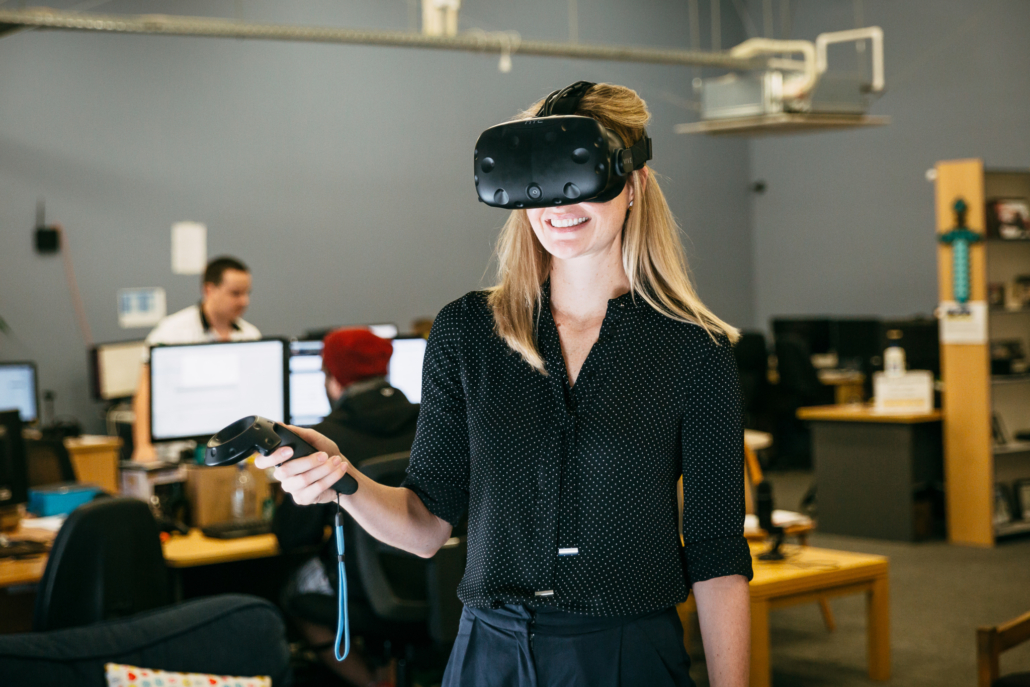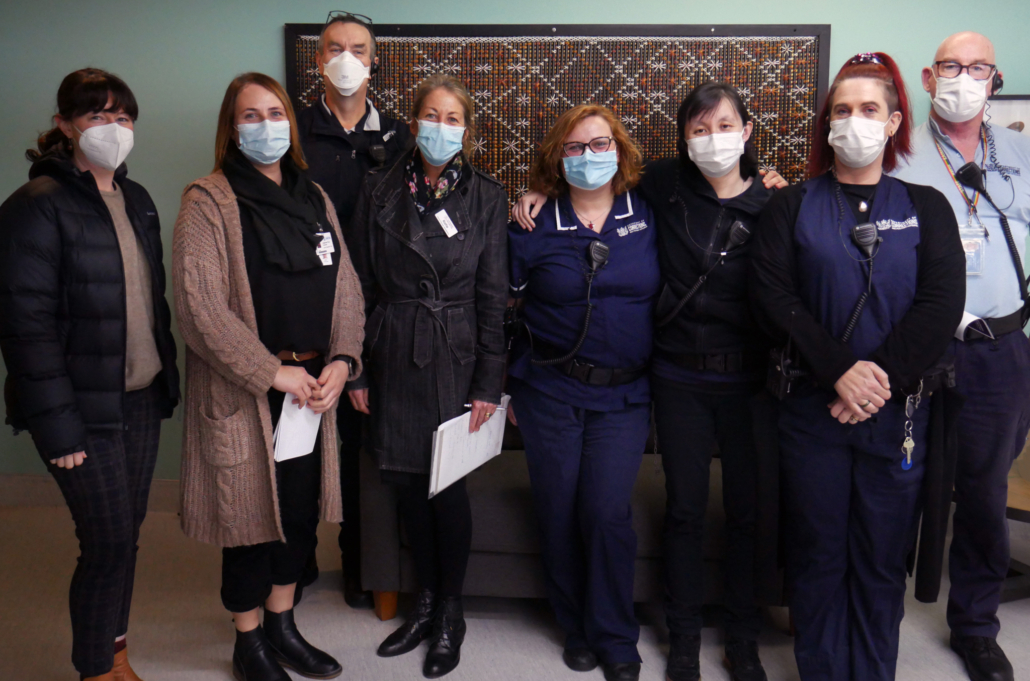Ongoing Research
At Laura Fergusson Brain Injury Trust, we are dedicated to promoting excellence in research, translating evidence into clinical practice, and providing ongoing community education. We aim to engage end-users in all aspects of our research, prioritising meaningful co-design and collaboration.
Virtual reality rehabilitation following traumatic brain injury
We have commenced an exciting research trial utilising a Virtual Reality (VR) Rehabilitation Tool to improve the management of cognitive fatigue and its impact on cognition and communication, following a traumatic brain injury (TBI). Therapists involved in the Trial are using this portable Tool in the client’s home and the clinic, as part of a rehabilitation programme.
The concept and design of the Tool was developed using a co-design process involving people with TBI, therapists specialised in TBI rehabilitation from LFBIT, researchers (Otago University, Christchurch, Auckland University, Empathic Computing Laboratory) and technical specialists (Callaghan Innovation and Cerebral Fix).
TBI education in Christchurch Women’s Prison
LFBIT received a Lottery Grant to provide neuropsychology assessments and TBI education in the Christchurch Women’s Prison and also Te Puna Wai o Tuhinapo. Neuropsychology assessments explore people’s medical and educational history and assess their cognitive strengths and weaknesses. The individuals complete a 2-3 hour assessment with the neuropsychologist, then they receive a feedback session about the results and a copy of the report and recommendations. The kaimahi involved in their care are also supported to help use the report to tailor interventions and rehabilitation to the individual.
The second part of the project is to provide TBI education to kaimahi in the Women’s Prison and Te Puna Wai o Tuhinapo to help identify ways to support someone who has a brain injury. This training has also been provided to organisations involved in community reintegration after release, with the aim being to build awareness about TBI in this population, how it can impact someone’s life and ways to support them.
Publications
Publications
- What’s in a Scope? Where Neuropsychology Meets Clinical Psychology. Paul Skirrow & Nic Ward. 2022. Click here for full article.
- A Personal Journey of Neuropsychology Within the Youth Justice System. Leanne Matthews. 2022. Click here for full article.
- Evaluation of a Group Programme for Adult Family Members of Individuals with Traumatic Brain Injury in Aotearoa New Zealand. Nic Ward, Siobhan Palmer, Nalita Naidu & Kristin Gozdzikowska. 2022. Click here for full article.
- Moora, S., Willimana, J., Drummonda, S., Fultona, C., Mayesa, W., Ward, N., … Stasiak, K. ‘E’ therapy in the community: Examination of the uptake and effectiveness of BRAVE (a self-help computer programme for anxiety in children and adolescents) in primary care. Internet Interventions, 2019.
- Palmer, S. & Dart, A. ‘Does the family become part of the team, or the team become part of the family? An Interview with a father 17 years after brain injury.’ In Family Experience of Brain Injury: Surviving, Coping, Adjusting. Wilson, J., & Holloway, 2019, Routledge.
- Eden, D., Williams, K., & Gozdzikowska, K. (2019). Working with cognitive communication disorders. Communication Matters, 34, 5.
- Eden, D., Williams, K., & Gozdzikowska, K. (2019). Education and training in cognitive-communication: A practitioner perspective. Communication Matters, 34, 6-7.
- Hopkins, P. (2018). Rehabilitation following Mild Traumatic Brain Injury. LOGIC (Journal of the New Zealand College of Primary Health Nurses), 2018, 17(1): 27-32.
- Dwyer, K, Mulligan, H. (2017). The experiences of individuals with a spinal cord injury following discharge from inpatient rehabilitation. International Journal of Therapy & Rehabilitation, 2017, 24(8):256-64.
- Dwyer, K, Mulligan, H. (2015). Community reintegration following spinal cord injury: Insights for health professionals in community rehabilitation services in New Zealand. New Zealand Journal of Physiotherapy, 2015, 43(3): 75-85.
- Perniskie E., Ward N., Dalrymple-Alford J., Alberts J., Jansari A., McLoughlin N. Comparison of a Virtual-Reality Test of Executive Function with Standard Executive Function Tests and their Ecological Validity
- Graham F, Sinnott K, Snell D, Martin R, Freeman C. (2013). A more “normal” life: Residents’, family, staff, and managers’ experience of active support at a residential facility for people with physical and intellectual impairments. J Intellect Dev Disabil. 2013, 38(3):256-64.
Conference contributions
42nd Australasian Society for the Study of Brain Impairment (ASSBI) Conference, 2019
Long-term follow-up of moderate-to-severe traumatic brain injury in the Canterbury region. Kristin Gozdzikowska, Katie Hodge
Meeting Unmet Needs: Education and Support for Adult Family Members of Individuals with Brain Injury. Nic Ward, Nalita Naidu, Siobhan Palmer
Post-traumatic Parkinsonism following severe traumatic brain injury: A case report. Kristin Gozdzikowska
Peer support following traumatic brain injury: Efficacy and impact of client-led group programmes. Eleanor Jackson, Peta Mann, Kristin Gozdzikowska
Y do I ACT like this: Adjusting to changes in sense of self after traumatic brain injury. Signe Wiingard, Siobhan Palmer, Nic Ward
Dysphagia following moderate-to-severe traumatic brain injury. Kristin Gozdzikowska, Katherine Williams
Emerging Tech in Health Symposium, 2019
Virtual Reality Rehabilitation following Traumatic Brain Injury. Kristin Gozdzikowska, Katie Hodge, Marcus King (Callaghan Innovation), Riley Stockwell (Cerebral Fix), Nadia Thorne (Cerebral Fix), Jo Nunnerley (University of Otago, BAIL)
6th Annual Asia-Oceanian Conference of Physical & Rehabilitation Medicine, 2018
Return to Work Following Moderate-to Severe Traumatic Brain Injury. Kristin Gozdzikowska, Katie Hodge, Pat Hopkins, Nic Ward
Behavioural Indicators of Emerging Consciousness following Severe Traumatic Brain Injury: A Case Series. Kristin Gozdzikowska, Katie Hodge
Demographic Characteristics of Moderate-to-Severe Traumatic Brain Injury in Canterbury. Kristin Gozdzikowska, Katie Hodge
Emerging Tech in Health Symposium, 2018
This session was called: Let’s stop pretending Social License is an actual thing – Kathryn Jones
Allied Health, Scientific and Technical Conference, 2018
Rehabilitation following Traumatic Brain Injury: Role of Allied Health and ACC. Kristin Gozdzikowska, Katie Hodge
New Zealand Rehabilitation Conference, 2017
Seamless Transition from Inpatient Facility to Community. Pat Hopkins, Delwyn Eden, Kristin Gozdzikowska, Katie Hodge
Health Care Providers: Return to Work Following Traumatic Brain Injury. Pat Hopkins, Kristin Gozdzikowska, Katie Hodge
Physiotherapy New Zealand Conference, 2016
Interactions with community health providers following discharge from inpatient rehabilitation: The experience of individuals with spinal cord injury. Kathryn Dwyer, Dr Hilda Mulligan (University of Otago)
AFRM/NZRA Rehabilitation Conference, 2015
Building Good Rehabilitation by Design. Katie Hodge, Co-presented with Krishnan C, Young T, Feist S
Health Informatics New Zealand (HiNZ) Conference, 2015
Kathryn Jones, Deanne Rowland, Anita Cox (Pegasus Health Canterbury)

